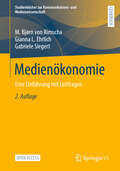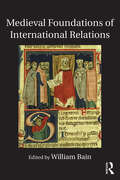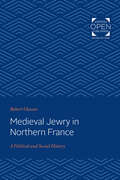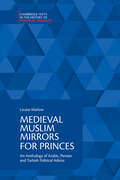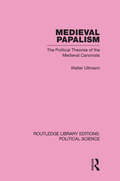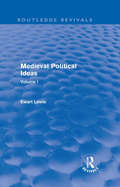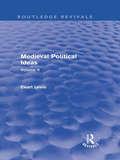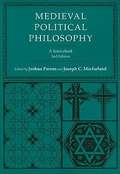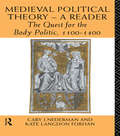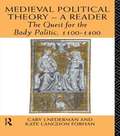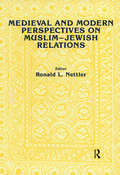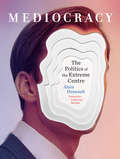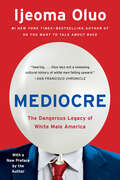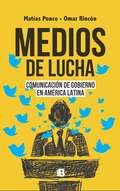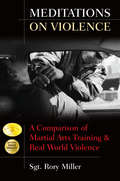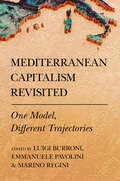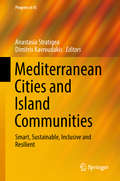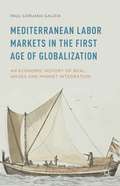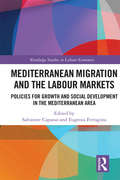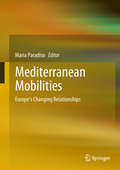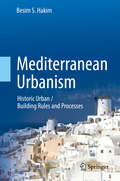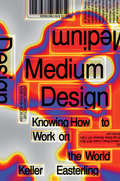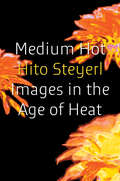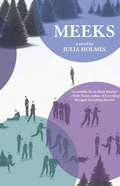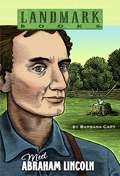- Table View
- List View
Medienökonomie: Eine Einführung mit Leitfragen (Studienbücher zur Kommunikations- und Medienwissenschaft)
by Gabriele Siegert M. Bjørn von Rimscha Gianna EhrlichAnhand von 13 Leitfragen führt dieses Open-Access-Lehrbuch in die Medienökonomie ein und stellt wesentliche Konzepte und Perspektiven vor. In den Antworten werden die in den Fragen aufgeworfenen Phänomene und Problemstellungen kontextualisiert und die jeweils involvierten Akteure, Theorien und Erklärungen vorgestellt. Die Orientierung an Problemfeldern und Beispielen erleichtert den Zugang zu den zugrunde liegenden theoretischen Konzepten und macht die Medienökonomie als Teilbereich der Publizistik- und Kommunikationswissenschaft greifbar.
Medieval Foundations of International Relations (Routledge Research in International Relations Theory)
by William BainThe purpose of this volume is to explore the medieval inheritance of modern international relations. Recent years have seen a flourishing of work on the history of international political thought, but the bulk of this has focused on the early modern and modern periods, leaving continuities with the medieval world largely ignored. The medieval is often used as a synonym for the barbaric and obsolete, yet this picture does not match that found in relevant work in the history of political thought. The book thus offers a chance to correct this misconception of the evolution of Western international thought, highlighting that the history of international thought should be regarded as an important dimension of thinking about the international and one that should not be consigned to history departments. Questions addressed include: what is the medieval influence on modern conception of rights, law, and community? how have medieval ideas shaped modern conceptions of self-determination, consent, and legitimacy? are there ‘medieval’ answers to ‘modern’ questions? is the modern world still working its way through the Middle Ages? to what extent is the ‘modern outlook’ genuinely secular? is there a ‘theology’ of international relations? what are the implications of continuity for predominant historical narrative of the emergence and expansion of international society? Medieval and modern are certainly different; however, this collection of essays proceeds from the conviction that the modern world was not built on a new plot with new building materials. Instead, it was constructed out of the rubble, that is, the raw materials, of the Middle Ages.This will be of great interest to students and scholars of IR, IR theory and political theory. .
Medieval Jewry in Northern France: A Political and Social History (The Johns Hopkins University Studies in Historical and Political Science)
by Robert ChazanOriginally published in 1974. Focusing on a set of Jewish communities, Robert Chazan tells how, by the eleventh century, French Jews had created for themselves a role as local merchants and moneylenders in adapting to the political, economic, and social limits imposed on them. French society, striving to become more powerful and civilized, was willing to extend aid and protection to the Jews in return for general stimulation of trade and urban life and for the immediate profit realized from taxation. While the authorities were relatively successful in protecting the Jews from others, there was no power to impose itself between the Jews and their protectors. The political and social well-being of the Jews was, therefore, dependent on the will of the governing authorities who taxed their holdings and regulated their activities. During the twelfth and thirteenth centuries, the position of the Jews was constantly under attack by reform elements in the church concerned with Jewish moneylending and blasphemous materials in Jewish books; these reformers were eventually devoted to a serious missionizing effort within the Jewish community. The Jews' situation was further complicated by deep popular animosity, expressing itself in a damaging set of slanders and occasionally in physical violence. Despite the impressive achievements of the Jews in medieval northern France, by the thirteenth century their community was increasingly constricted; and in 1306, they were expelled from royal France by Philip IV. Overcoming the handicap of a lack of copious source material, Chazan analyzes the Jews' political status, their relations with key elements of Christian society, their demographic development, their economic outlets, their internal organization, and their attitudes toward the Christian environment. As it highlights aspects of French society from an unusual perspective, Medieval Jewry in Northern France should be of special interest to the historian of medieval France as well as to the student of Jewish history. This story is also significant for all who are fascinated by the capacity of human groups to respond and adapt creatively to a hostile and limiting environment.
Medieval Muslim Mirrors for Princes: An Anthology of Arabic, Persian and Turkish Political Advice (Cambridge Texts in the History of Political Thought)
by Louise MarlowThe 'mirror for princes' genre of literature offers advice to a ruler, or ruler-to-be, concerning the exercise of royal power and the wellbeing of the body politic. This anthology presents selections from the 'mirror literature' produced in the Islamic Early Middle Period (roughly the tenth to twelfth centuries CE), newly translated from the original Arabic and Persian, as well as a previously translated Turkish example. In these texts, authors advise on a host of political issues which remain compelling to our contemporary world: political legitimacy and the ruler's responsibilities, the limits of the ruler's power and the limits of the subjects' duty of obedience, the maintenance of social stability, causes of unrest, licit and illicit uses of force, the functions of governmental offices and the status and rights of diverse social groups. Medieval Muslim Mirrors for Princes is a unique introduction to this important body of literature, showing how these texts reflect and respond to the circumstances and conditions of their era, and of ours.
Medieval Papalism (Routledge Library Editions: Political Science #36)
by Walter UllmannThis volume deals with the problem of State and Church in the Middle Ages from a new angle. It not only shows how and why the medieval popes pursued a policy of world domination, but also discloses the ideas by which the papal monarchs were primarily influenced.
Medieval Political Ideas: Volume I (Routledge Revivals)
by Ewart LewisFirst published in 1954, this book explores the political ideas of the Middle Ages. It covers the period from the investiture struggle to the end of the fifteenth century and provides comprehensive readings of otherwise inaccessible source material. Each chapter begins with an introductory essay on the subject at hand that leads to a number of translated passages, numerous enough to display a variety of opinion and long enough to indicate the process of thought as well as its conclusions. This book is the first of a two volume set and will be useful to teachers and advanced students of political theory and medieval history. Topics discussed in this volume include law, property and lordship, political authority and community.
Medieval Political Ideas: Volume II (Routledge Revivals)
by Ewart LewisFirst published in 1954, this book explores the political ideas of the Middle Ages. It covers the period from the investiture struggle to the end of the fifteenth century and provides comprehensive readings of otherwise inaccessible source material. Each chapter begins with an introductory essay on the subject at hand that leads to a number of translated passages, numerous enough to display a variety of opinion and long enough to indicate the process of thought as well as its conclusions. This book is the second of a two volume set and will be useful to teachers and advanced students of political theory and medieval history. Topics discussed in this volume include authority in the Church, the problem of the Empire and the relationship between the Church and the State.
Medieval Political Philosophy: A Sourcebook
by Joshua Parens Joseph MacfarlandMedieval Political Philosophy: A Sourcebook, edited by Ralph Lerner and Muhsin Mahdi, has been a classroom favorite since its publication in 1963. When it first appeared, it was the only anthology of medieval political philosophy to contain major texts from all three Western monotheistic traditions--Christianity, Judaism, and Islam--and that claim remains true today. This new edition of this classic text of political philosophy--revised and enlarged by Joshua Parens and Joseph C. Macfarland--will make accessible to today's students the insights of these profound medieval thinkers. <p><p> Prior to the modern separation of religion from politics, these medieval thinkers explored a variety of approaches to the relation between religion and politics--approaches that prompted renewed interest in a world divided over how best to relate the two. For the authors gathered in this volume--including Alfarabi, Alghazali, Averroes, Maimonides, Judah Halevi, Thomas Aquinas, Boethius of Dacia, and Dante Alighieri among many others--there was a greater uniformity of general intention than at any other period. All of these authors studied the works of classical political philosophy and considered in a variety of ways the implications of this political thought for their contemporary situation in a monotheistic religious community.
Medieval Political Theory: The Quest for the Body Politic 1100-1400
by Cary J. Nederman Kate Langdon ForhanA textbook anthology of important works of political thought revealing the development of ideas from the 12th to the 15th centuries. Includes new translations of both well-known and ignored writers, and an introductory overview.
Medieval Political Theory: The Quest for the Body Politic, 1100-1400
by Cary J. Nederman Kate L. ForhanA textbook anthology of important works of political thought revealing the development of ideas from the 12th to the 15th centuries. Includes new translations of both well-known and ignored writers, and an introductory overview.
Medieval and Modern Perspectives on Muslim-Jewish Relations (Studies In Muslim-jewish Relations Ser. #Vol. 2.)
by Ronald L. NettlerFirst Published in 1995. The life of Jews in medieval Baghdad or 18th-century Tunis may now be considered to be important as Jewish life in 13th-century Worms or 19th-century Poland. Islamic theological and exegetical writing on Judaism may now command as much interest as their counterparts in Christian literature, while the rich Islamic-Jewish cultural interchange over many centuries is clearly of great significance. Studies in Muslim-Jewish Relations will be a series of general volumes each including a wide range of subjects, periodic edited volumes each focusing on a certain theme, and a planned related monograph series which will publish authored volumes on more specialized aspects of the field. This volume is a collection of twelve essays.
Mediocracy: The Politics of the Extreme Centre
by Alain DeneaultThere was no Reichstag fire. No storming of the Bastille. No mutiny on the Aurora. Instead, the mediocre have seized power without firing a single shot. They rose to power on the tide of an economy where workers produce assembly-line meals without knowing how to cook at home, give customers instructions over the phone that they themselves don’t understand, or sell books and newspapers that they never read. Canadian intellectual juggernaut Alain Deneault has taken on all kinds of evildoers: mining companies, tax-dodgers, and corporate criminals. Now he takes on the most menacing threat of all: the mediocre.
Mediocre: The Dangerous Legacy of White Male America
by Ijeoma OluoFrom the author of the New York Times bestseller So You Want to Talk About Race, a subversive history of white male American identity.What happens to a country that tells generation after generation of white men that they deserve power? What happens when success is defined by status over women and people of color, instead of by actual accomplishments?Through the last 150 years of American history -- from the post-reconstruction South and the mythic stories of cowboys in the West, to the present-day controversy over NFL protests and the backlash against the rise of women in politics -- Ijeoma Oluo exposes the devastating consequences of white male supremacy on women, people of color, and white men themselves. Mediocre investigates the real costs of this phenomenon in order to imagine a new white male identity, one free from racism and sexism.As provocative as it is essential, this book will upend everything you thought you knew about American identity and offers a bold new vision of American greatness.
Medios de lucha: Comunicación de gobierno en América Latina
by Matias Ponce Omar RinconCompleto análisis de la comunicación de los gobiernos en América Latina en el período 2010-2016. <P><P>2017, la década triunfante del progresismo en América Latina ha quedado atrás. Con ella quedan por el camino un conjunto importante de recetas comunicacionales que no fueron sustentables en el tiempo, pero que sirvieron para construir la legitimidad del progresismo en América Latina. Hoy, una embestida de gobiernos vinculados a la derecha política está de nuevo en el poder. <P>¿Qué pasó en la construcción de estrategias de comunicación de gobierno mientras tanto? ¿Fue la comunicación o fue la conducción política la que explica el ocaso popular de los Kirchner, Lula, Humala, Bachelet y el chavismo en la región? <P>Como una continuidad de Caudillismo, e-política y teledemocracia, Comunicación de Gobierno en América Latina 2005-2010 (Ponce y Rincón, 2013) este libro no otorga respuestas completas a las interrogantes sobre la comunicación de gobierno en América Latina, pero sí repasa con una metodología de análisis común, cuáles fueron las estrategias seguidas por cada uno de los gobiernos de América Latina en el período 2010-2016. <P>Plantados en batallas campales entre la cobertura de las noticias y la construcción de estrategias para ganarse a la mayoría de la opinión pública, los actores de gobierno desplegaron diversos medios de lucha. Unos triunfaron y otros quedaron por el camino. En esta publicación encontrará la obra más completa de análisis de comunicación de gobierno de la región, donde destacados analistas académicos de cada país reconstruyen los mitos de gobierno, los héroes y anti-héroes y el relato en que se basó cada gobierno para elaborar su estrategia de comunicación. Además podrá repasar cómo fue el relacionamiento con la prensa para cada uno de los gobiernos y el resultado que cada estrategia tuvo en los niveles de aprobación de cada gobierno.
Meditations on Violence: A Comparison of Martial Arts Training & Real World Violence
by Rory MillerA Comparison of Martial Arts Training & Real-World Violence. Experienced martial artist and veteran correction officer Sgt. Rory Miller distills what he has learned from jailhouse brawls, tactical operations and ambushes to explore the differences between martial arts and the subject martial arts were designed to deal with: Violence. In section one, Sgt. Miller introduces the myths, metaphors and expectations that most martial artists have about what they will ultimately learn in their dojo. This is then compared with the complexity of the reality of violence. Complexity is one of the recurring themes throughout this work. Section two examines how to think critically about violence, how to evaluate sources of knowledge and clearly explains the concepts of strategy and tactics. Sections three and four focus on the dynamics of violence itself and the predators who perpetuate it. Drawing on hundreds of encounters and thousands of hours spent with criminals Sgt. Miller explains the types of violence; how, where, when and why it develops; the effects of adrenaline; how criminals think, and even the effects of drugs and altered states of consciousness in a fight. Section five centers on training for violence, and adapting your present training methods to that reality. It discusses the pros and cons of modern and ancient martial arts training and gives a unique insight into early Japanese kata as a military training method. Section six is all about how to make self-defense work. Miller examines how to look at defense in a broader context, and how to overcome some of your own subconscious resistance to meeting violence with violence. The last section deals with the aftermath--the cost of surviving sudden violence or violent environments, how it can change you for good or bad. It gives advice for supervisors and even for instructors on how to help a student/survivor. You'll even learn a bit about enlightenment. Rory Miller has served for seventeen years in corrections as an officer and sergeant working maximum security, booking and mental health; leading a tactical team; and teaching subjects ranging from Defensive Tactics and Use of Force to First Aid and Crisis Communications with the Mentally Ill.
Mediterranean Capitalism Revisited: One Model, Different Trajectories (Cornell Studies in Political Economy)
by Luigi Burroni, Emmanuele Pavolini, and Marino ReginiMediterranean Capitalism Revisited brings together leading experts on the political economies of southern Europe—specifically Greece, Italy, Spain, and Portugal—to closely analyze and explain the primary socioeconomic and institutional features that define "Mediterranean capitalism" within the wider European context. These economies share a number of features, most notably their difficulties to provide viable answers to the challenge of globalization.By examining and comparing such components as welfare, education and innovation policies, cultural dimensions, and labor market regulation, Mediterranean Capitalism Revisited attends to both commonalities and divergences between the four countries, identifying the main reasons behind the poor performance of their economies and slow recovery from the Great Recession of 2007–2008. This volume also sheds light on the process of diversification among the four countries and addresses whether it did and still does make sense to speak of a uniquely Mediterranean model of capitalism.Contributors: Alexandre Afonso, Leiden University; Lucio Baccaro, Max Planck Institute for the Study of Societies; Rui Branco, NOVA University of Lisbon; Fabio Bulfone, Max Planck Institute for the Study of Societies; Giliberto Capano, University of Bologna; Sabrina Colombo, University of Milan; Lisa Dorigatti, University of Milan; Ana M. Guillén, University of Oviedo; Matteo Jessoula, University of Milan; Andrea Lippi, University of Florence; Manos Matsaganis, Polytechnic University of Milan; Oscar Molina, Autonomous University of Barcelona; Manuela Moschella, Scuola Normale Superiore; Sofia A. Pérez, Boston University; Gemma Scalise, University of Bergamo; Arianna Tassinari, Max Planck Institute for the Study of Societies.
Mediterranean Cities and Island Communities: Smart, Sustainable, Inclusive and Resilient (Progress in IS)
by Anastasia Stratigea Dimitris KavroudakisThis book addresses the issue of smart and sustainable development in the Mediterranean (MED) region, a distinct part of the world, full of challenges and risks but also opportunities. Above all, the book focuses on smartening up small and medium-sized cities and insular communities, taking into account their geographical peculiarities, the pattern of MED urban settlements and the abundance of island complexes in the MED Basin. Taking for granted that sustainability in the MED is the overarching policy goal that needs to be served, the book explores different aspects of smartness in support of this goal’s achievement. In this respect, evidence from concrete smart developments adopted by forerunners in the MED region is collected and analyzed; coupled with experiences gathered from successful, non-MED, examples of smart efforts in European countries. More specifically, current research and empirical results from MED urban environments are discussed, as well as findings from or concerning other parts of the world, which are of relevance to the MED region. The book’s primary goal is to enable policymakers, planners and decision-making bodies to recognize the challenges and options available; and make to more informed policy decisions towards smart, sustainable, inclusive and resilient urban and regional futures in the MED.
Mediterranean Labor Markets in the First Age of Globalization
by Paul Caruana GaliziaScholars have studied the nineteenth century's unprecedented labor flows in global and specific country contexts, but have lacked a comprehensive analysis of the world's old economic core, the Mediterranean. This work provides answers to important questions, such as: If the Mediterranean labor market really was integrated, then why did globalization affect the Western and Eastern Mediterranean so differently? Why did wage inequality rise in the East while it fell in the rest of the labor-abundant periphery? More broadly, was low emigration from Iberia and the East to blame for the Mediterranean's failed integration with the fast-expanding global economy? This ground-breaking research relates these questions to ongoing historical debates on the intensity of intra-Mediterranean integration in goods and labor, to current heated debates on North African emigration to Europe, and to discussions on European economic integration more generally.
Mediterranean Migration and the Labour Markets: Policies for Growth and Social Development in the Mediterranean Area (Routledge Studies in Labour Economics)
by Salvatore CapassoThis book focuses on issues that are relevant for the Euro-Mediterranean Partnership. The depth and the extension of the current political crisis in the area have changed the perspectives of conventional Euro-Mediterranean integration policies. The book provides the grounds for new patterns of analysis and addresses policy guidelines which are able to respond to the dramatic challenges that Mediterranean regions are facing. By implementing a multidisciplinary approach, the volume uncovers the structural determinants of migrations in the area: territorial and social imbalances, climate change, unemployment, weak institutions, poor governance, lack of efficient redistributive policies. Each chapter proposes innovative and rich analyses of the socio-economic conditions of all Mediterranean countries. The prevailing evidence suggests that while the North-South imbalances still persist inside the basin, the recent world economic and financial crises have deepened social, intergenerational and gender inequalities. These inequalities cross all territories both nationally and internationally and affect the living conditions of large segments of population in Southern and Eastern Mediterranean countries. To bridge these gaps it is necessary to strengthen territorial cohesion, reduce income differentials, and improve the access of marginal areas to basic infrastructure. These long term goals can be achieved through an inclusive development model for which young people and women can enjoy the same opportunities of education and work. Offering innovative and practical guidelines for future programs and policies, this book is essential reading for policy makers, researchers at policy think tanks as well as academics and post graduate students of Mediterranean studies and Economic Policy. The general policy recipes, provided to govern migration flows, make useful reading for national and international research centres and major governmental agencies interested in migration issues.
Mediterranean Mobilities: Europe's Changing Relationships
by Maria ParadisoThis book critically assesses mobilities across the Mediterranean Basin and explores the implications of changing European relationships in the light of observations of the intersectional formation and evolution of identities, behavior and ideas. Further, it discusses the timely topic of a new diversity of migration and mobility practices (personal and virtual mobilities in terms of gender, motivations, emotional geographies, impacts, and circulation) from conceptual and empirical perspectives, providing new insights for scholars and policy makers in the context of urgently needed national and European policies. Mediterranean Mobilities is based on fieldwork in European and non-European countries and on mutual learning and transfer of knowledge among scholars from nine universities in Morocco, Algeria, Israel, Ireland, Italy, Portugal and Spain, as well as stakeholders in Europe and North Africa. The results stem from the FP7 Marie Curie IRSES project MEDCHANGe coordinated by the book editor. The project comprises fieldwork conducted by distinguished scholars in Europe, Morocco, Algeria and Israel, generating original data and findings on fast changing realities. This book appeals to researchers but also serves as a basic or complementary text in advanced undergraduate, graduate or master’s courses on mobilities/migration, regionalization, cooperation, international relations and Mediterranean studies as part of teaching programs in geography, sociology, international political sciences, as well as programs focusing on regional studies (e.g., European integration). It is also of interest to the professional and institutional community in the wide area of Mediterranean politics, economy and society as well as a general readership.
Mediterranean Urbanism
by Besim S. HakimThis book brings together historic urban / building rules and codes for the geographic areas including Greece, Italy and Spain. The author achieved his ambitious goal of finding pertinent rules and codes that were followed in previous societies for the processes that formed the built environment of their towns and cities, including building activities at the neighborhood level and the decision-making process that took place between proximate neighbors. The original languages of the texts that were translated into English are Greek, Latin, Italian, Arabic and Spanish. The sources for the chapter on Greece date from the 2nd century B. C. E. to the 19th century C. E. Those for the chapter on Italy date from the 10th to the 14th centuries C. E. and for the chapter on Spain from the 5th to the 18th centuries C. E. Numerous appendices are included to enhance and elaborate on the material that make up the chapters. This book provides lessons and insights into how compact and sustainable towns and cities that are greatly admired today were achieved in the past and how we and future generations can learn from this rich heritage, including the valuable insight provided by the nature of the rules and codes and their application through centuries of continuous use.
Medium Design: Knowing How to Work on the World
by Keller EasterlingHow to Design the World: Working Without SolutionsIn Medium Design everyone is a designer. But design, in this case, inverts the typical focus on object over its settings to concentrate on the medium—the matrix space between objects, events, and ideological declarations. It disrupts habitual modern approaches to the world&’s intractable dilemmas—from climate cataclysm to inequality to concentrations of authoritarian power. In a series of case studies dealing with everything from automation and migration to explosive urban growth and atmospheric changes, Medium Design offers spatial tools for innovation and global decision-making to challenge the authority of more familiar legal or economic approaches.From this perspective, solutions are mistakes and ideologies are unreliable guides. Rather than the modern desire for the new, designers find more sophistication in relationships between emergent and incumbent technologies. Encouraging entanglement, medium design does not try to eliminate problems but rather to put them together in productive combinations. And in the process of reconceptualizing design, Easterling puzzles over bulletproof powers, Stanley Kubrick, ISIS recruits, literary characters, and iconic activists in the hope of outwitting political deadlocks and offering forms of activism for modulating power and temperament in organizations of all kinds.
Medium Hot: Images in The Age of Heat
by Hito SteyerlWHAT IS THE FUTURE OF THE IMAGE IN THE AGE OF CLIMATE CHANGE AND ARTIFICIAL INTELLIGENCE?Hito Steyerl is one of the most celebrated artists of our time. Her work, both as an artist and a writer, has consistently challenged the political boundaries between art and technology. In this new collection of groundbreaking essays, she explores how AI, the use of large language models and the algorithmic creation of imagery transform our understanding of the world. She argues that such practices cannot be divorced from the economic and political conditions of the times.Medium Hot is a collection of scintillating meditations on the limits of art and technology: the essential handbook for the present conjuncture. The pieces here probe the manufacture and distribution of images in the age of AI and climate change. She asks whether art can be made not only by machines but for machines. She argues against the production of images that heat up the planet, disfranchise workers and fuel the arms trade, and questions whether such creations can even be called art.In an era of such rapid change, Steyerl does vital work investigating whether machine learning will infiltrate every aspect of our lives and what that means for the future.
Meeks
by Julia HolmesNo woman will have Ben without a proper bachelor's suit . . . and the tailor refuses to make him one. Back from war with a nameless enemy, Ben finds that his mother is dead and his family home has been reassigned by the state. As if that isn't enough, he must now find a wife, or he'll be made a civil servant and given a permanent spot in one of the city's oppressive factories.Meanwhile, Meeks, a foreigner who lives in the park and imagines he's a member of the police, is hunted by the overzealous Brothers of Mercy. Meeks' survival depends on his peculiar friendship with a police captain--but will that be enough to prevent his execution at the annual Independence Day celebration?A dark satire rendered with the slapstick humor of a Buster Keaton film, Julia Holmes' debut marries the existentialism of Fyodor Dostoevsky's Notes from Underground to the strange charm of a Haruki Murakami novel. Meeks portrays a world at once hilarious and disquieting, in which frustrated revolutionaries and hopeful youths suffer alongside the lost and the condemned, just for a chance at the permanent bliss of marriage and a slice of sugar-frosted Independence Day cake.Julia Holmes was born in Dhahran, Saudi Arabia, and grew up in the Middle East, Texas, and New York, where she is currently an assistant editor at Rolling Stone. She is a graduate of Columbia University's MFA program in fiction.
Meet Abraham Lincoln (Landmark Books)
by Barbara CaryThis warmly told biography of our sixteenth president is enriched by many authentic but seldom told anecdotes and complemented by bold color illustrations that capture the spirit of Lincoln and his era. From the Trade Paperback edition.
